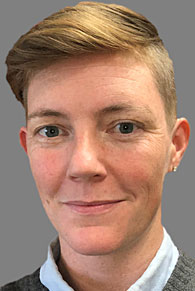With the support of a $6,000 grant from the National Endowment of the Humanities, Lawrence University’s Constance Kassor will put her expertise in classical Tibetan language to use this summer.
Beginning July 1, Kassor, an assistant professor of religious studies at Lawrence, will spend two months in Kathmandu, Nepal, working on a translation of the 15th-century Tibetan Buddhist text “Synopsis of the Middle Way.” It’s a project Kassor first began tackling in 2014.

The “Synopsis” is an encyclopedic, 459-page treatise, composed by the influential philosopher Gorampa Sonam Senge (1429-89), considered the most significant philosopher in a minority sect of Tibetan Buddhism known as Sakya. Gorampa is renowned for arguing against his philosophical rival Tsongkhapa (1357-1419), founder of what later came to be known as the Gelug sect.
“Gorampa is best remembered for his harsh, vehement criticism against the Gelug sect, which is the school the Dalai Lama belongs to,” explained Kassor, who joined the Lawrence faculty in 2016. “He criticized that school very negatively in his philosophical writings. His criticism was considered so harsh that the 5th Dalai Lama banned all of his texts in Tibet. From the 17th century until about 1925, Gorampa’s texts were only studied secretly in remote areas of eastern Tibet. In the 1920s, the 13th Dalai Lama gave permission for this text to be brought out again to the world. Now, his work is experiencing a revival.”
Despite renewed interest in Gorampa’s views, only two of his complete extant works have been translated into English. The vast majority of English-language scholarship on Tibetan philosophy consists of texts written from within the dominant Gelug sect while comparatively little English-language scholarship focuses on the Sakya and other minority traditions.
While in Nepal, Kassor will collaborate with Ven. Dr. Ngawang Jorden, a Tibetan monk and the principal of the International Buddhist Academy, which is part school, part monastic institution, part leadership center.
The text Kassor is translating was written in classical Tibetan, which is different from modern spoken Tibetan.
“They are about as different as English and Latin,” said Kassor, who is fluent in modern Tibetan. “Jorden is a monk who has lived most of his life in India, but got his Ph.D. from Harvard. “He’s fluent in English and I am pretty good in classical Tibetan, so we make a good working team.”
Four years into the translation project, Kassor estimates she’s about three-quarters finished.
“My goal for the summer in the time I’m going to spend with Jorden is to work on a couple of the most difficult passages with him. I hope to have the entire text translated in another two years.”
Kassor said she has received preliminary interest from several publishers for her translation once its completed.
“The issues raised by Gorampa and his interlocutors in this text will be of interest to scholars of Buddhist and Western philosophical traditions,” said Kassor, “as well as to a broader audience interested in questions concerning the nature of knowledge and the mind more generally.”
Established in 1965 as an independent federal agency, the National Endowment for the Humanities (NEH) promotes excellence in the humanities and conveying the lessons of history by awarding grants for top-rated proposals examined by panels of independent, external reviewers.
NEH grants typically go to cultural institutions as well as to individual scholars. The grants are designed to strengthen teaching and learning in schools and colleges; facilitate research and original scholarship; provide opportunities for lifelong learning; preserve and provide access to cultural and educational resources; and strengthen the institutional base of the humanities.
About Lawrence University
Founded in 1847, Lawrence University uniquely integrates a college of liberal arts and sciences with a nationally recognized conservatory of music, both devoted exclusively to undergraduate education. It was selected for inclusion in the book “Colleges That Change Lives: 40 Schools That Will Change the Way You Think About College.” Engaged learning, the development of multiple interests and community outreach are central to the Lawrence experience. Lawrence draws its 1,500 students from nearly every state and more than 50 countries.